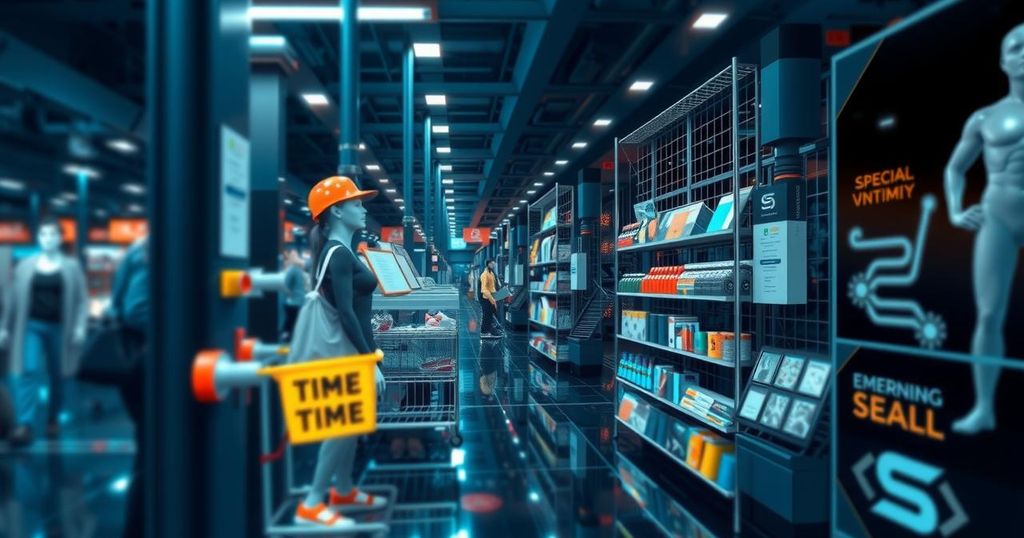Top Retail Technology Trends for 2024: Embracing Innovation in Shopping
In 2024, the retail industry witnesses groundbreaking technological shifts defined by phygital commerce, efficient delivery systems, and AI-driven personalization. Retailers are investing heavily in technology to enhance customer experiences while navigating challenges like integration and support. Fostering adaptability, security, and engagement with Gen Z shoppers are critical strategies for success this year.
As we step into 2024, the retail landscape resembles a vibrant tapestry of innovation, where shopping becomes an exhilarating ride through expansive digital markets and immersive physical stores. Whether you’re running a quaint boutique or steering a colossal chain, keeping your finger on the pulse of these emerging technologies is a necessity for not just survival but growth in this dynamic sector. From the integration of cutting-edge AI to the seamless merging of online and offline experiences, this year promises to be transformative.
In this year’s technological revolution, several key trends are setting the stage for intriguing developments. The rise of phygital commerce is now central, where the lines between physical enjoyment and digital convenience blur beautifully. Imagine selecting a stylish jacket in a downtown shop, then customizing it on a sleek tablet, ordering it for delivery to your door – this is more than innovation; it’s a reimagining of how we connect with brands.
Moreover, frictionless delivery systems are emerging as a staple; consumers can rejoice as drones whiz overhead and logistics expand to minimize waiting times. Mobile and social shopping platforms are also at the forefront, seamlessly integrating apps with platforms like Instagram, engaging a younger audience who craves ease and interaction in their shopping endeavors. Meanwhile, AI technology personalizes experiences like never before, presenting curated selections that make each visit feel uniquely crafted for the consumer.
The investment climate for retail technology in 2024 is more robust than ever. Retailers are honing in on strategies that prioritize customer experience, funneling money into AI and comprehensive data analytics. This technological pivot also includes significant funding in marketing that emphasizes automation and personalization alongside an IT focus aimed at maintaining cybersecurity. As these investments develop, the demand for advanced retail management software only escalates, emphasizing operational efficiency and insightful analytics.
However, the journey is not without its hurdles. Retailers have hit bumps along the road such as integration challenges, where promising technologies struggle to mesh with existing systems. A lack of clear training protocols can stymie success, often leaving staff overwhelmed rather than empowered. Technical support issues post-implementation can also add undue stress, jeopardizing operational smoothness.
To navigate these challenges, adaptability is vital. Retailers must swiftly adjust to evolving consumer expectations, utilizing technology that blends the best of both shopping worlds. Prioritizing data management is essential, particularly in light of rising privacy concerns. Engaging Gen Z must center around sustainability and authenticity while cleverly harnessing social media’s expansive reach for effective marketing and direct interactions.
For software providers, understanding the unique landscape of retail needs is critical. Crafting tailored solutions that directly address pain points and enhancing user experience can foster deeper customer satisfaction and loyalty. Clear communication and effective marketing strategies are equally important to avoid buyer’s regret and showcase the true value of new technologies.
In conclusion, as we embrace 2024, the convergence of digital and physical shopping signifies a thrilling adventure in the retail world. With AI driving hyper-personalization and innovations like phygital commerce enhancing customer journeys, firms must adapt and innovate to remain at the forefront. As technology seeds new growth opportunities, retailers and solution providers alike are poised to lead this dynamic landscape forward, forever altering the shopping experience for consumers everywhere.
The retail industry is undergoing rapid changes fueled by advancements in technology. The term “phygital commerce” embodies the blending of online and offline shopping experiences, responding to increasingly engaged consumers. Efficiency drives the demand for seamless delivery systems, while marketing and social media influence contemporary shopping habits, particularly among younger demographics. Technologies like AI not only personalize the shopping experience but also reshape how retailers manage operations. This year is seen as pivotal for investment in these trends, highlighting both opportunities and challenges in integrating new systems effectively.
The retail technology scene of 2024 is vibrant and transformative. Key trends such as phygital commerce, frictionless delivery systems, AI personalization, and immersive shopping experiences are steering the industry toward a more engaging and efficient future. However, for retailers, adapting quickly to new technologies and ensuring effective integration is essential for success. Embracing these innovations will not only enhance customer interactions but also pave the way for sustainable growth in a competitive landscape.
Original Source: retailtechinnovationhub.com




Post Comment